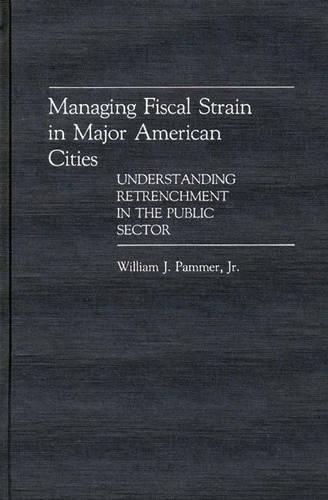
Managing Fiscal Strain in Major American Cities: Understanding Retrenchment in the Public Sector
(Hardback)
Publishing Details
Managing Fiscal Strain in Major American Cities: Understanding Retrenchment in the Public Sector
By (Author) William Pammer
Bloomsbury Publishing PLC
Praeger Publishers Inc
12th February 1990
United States
Classifications
Tertiary Education
Non Fiction
Public finance and taxation
352.10973
Physical Properties
Hardback
151
Description
This work offers evaluations and a pro-and-con analysis of various retrenchment strategies. It focuses specifically on how environmental conditions and administrative and political aspects of cities affect the decisions to implement specific retrenchment strategies during periods of revenue decline or stagnation. The book takes the reader beyond the rationalistic and incremental approach of urban decision-making and demonstrates that decisions requiring fiscal retrenchment can be confusing and ill-planned. It also reveals how any action taken by the city will reflect the chief executive officer's perception of what the situation demands.
Reviews
The book is definitely worth reading and will be a great service to those interested in these issues.-Choice
This book offers frank evaluations and a pro-and-con analysis of various retrenchment strategies. It focuses on how environmental conditions and administrative and political aspects of cities affect the decisions to implement specific retrenchment strategies during periods of revenue decline or stagnation. The book goes beyond the rationalistic and incremental approach of urban decision-making and demonstrates that decisions requiring fiscal retrenchment can be confusing and ill-planned.-RPGP
This volume attempts evaluations and a pro-and-con analysis of various retrenchment strategies, focusing specifically on how environmental conditions and administrative and political aspects of cities affect the decisions to implement specific retrenchment strategies during periods of revenue decline or stagnation. An attempt is made to go beyond the rationalistic and incremental approach of urban decision making to demonstrate that decisions requiring fiscal retrenchment can be confusing and ill-planned. Any action taken by the city will reflect, it is argued, the chief executive officer's perception of what the situation demands. The book leads off with a discussion of the structural antecedents that have contributed to the decline of financial sources. The book then goes on to deal with different management techniques available to municipalities to cope with resource decline. The strategic advantages and political ramifications of these approaches are discussed. An inventory of response techniques for urban managers is also provided. The book continues with an argument, building upon the garbage can model, that the retrenchment process is haphazard and random. The book concludes with considerations of what happens to the urban policy process during periods of resource scarcity.-Sage Urban Studies Abstracts
"The book is definitely worth reading and will be a great service to those interested in these issues."-Choice
"This book offers frank evaluations and a pro-and-con analysis of various retrenchment strategies. It focuses on how environmental conditions and administrative and political aspects of cities affect the decisions to implement specific retrenchment strategies during periods of revenue decline or stagnation. The book goes beyond the rationalistic and incremental approach of urban decision-making and demonstrates that decisions requiring fiscal retrenchment can be confusing and ill-planned."-RPGP
"This volume attempts evaluations and a pro-and-con analysis of various retrenchment strategies, focusing specifically on how environmental conditions and administrative and political aspects of cities affect the decisions to implement specific retrenchment strategies during periods of revenue decline or stagnation. An attempt is made to go beyond the rationalistic and incremental approach of urban decision making to demonstrate that decisions requiring fiscal retrenchment can be confusing and ill-planned. Any action taken by the city will reflect, it is argued, the chief executive officer's perception of what the situation demands. The book leads off with a discussion of the structural antecedents that have contributed to the decline of financial sources. The book then goes on to deal with different management techniques available to municipalities to cope with resource decline. The strategic advantages and political ramifications of these approaches are discussed. An inventory of response techniques for urban managers is also provided. The book continues with an argument, building upon the garbage can model, that the retrenchment process is haphazard and random. The book concludes with considerations of what happens to the urban policy process during periods of resource scarcity."-Sage Urban Studies Abstracts
Author Bio
WILLIAM J. PAMMER, JR., is Assistant Director in the Center for Urban and Public Affairs and an Assistant Professor of Urban Affairs at Wright State University. He is the co-author of Ambush Related Assaults on Police: Violence at the Street Level.
